
Canadian Ammolite Gemstone: Colors, Properties, Value & Information
 Ammolite is a multi-colored, iridescent gemstone found in Canada. This opal-like, organic gemstone is the fossilized shell of an extinct mollusk called ammonite.
Ammolite is a multi-colored, iridescent gemstone found in Canada. This opal-like, organic gemstone is the fossilized shell of an extinct mollusk called ammonite.
What is the difference between ammonite and ammolite? Ammolite is a trade name for gem-quality material from fossilized ammonite shells.
You could technically call all ammolite ammonite, but only the rare, gem-quality ammonite material can be called ammolite.
Is ammolite a rare stone? Yes, ammolite is actually one of the rarest gemstones! Potential material is currently limited to a small area, and it’s estimated only 5% of that ammonite is usable for gemstones.
Today, we’ll tell you all the Canadian ammolite properties, healing uses, and legends that make this gemstone such a treasure.
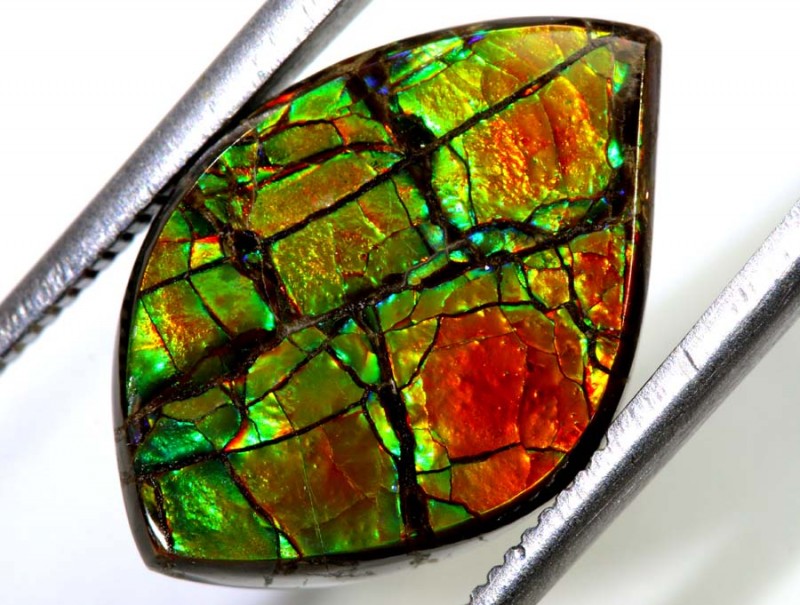
About Canadian Ammolite Stone
Ammolite is a semi-precious gemstone, similar to other biogenic gems like pearl. A biogenic gemstone is formed by (or out of) a living organism.
Other names for ammolite include calcentine, Korite, and aapoak. “Korite” is a trade name from the biggest ammolite supplier. The Kainai people (a Blackfoot First Nation tribe in Southern Alberta) use aapoak, meaning “small, crawling stone,” after the shell’s coiled-snake shape.
More often, the ammolite shell shape is compared to a ram’s horn. Unsurprisingly, this gem is a zodiac stone for Aries, the Ram sign.
Plus, ancient Egyptians’ astrology connected Aries to the sun god Ammon, who they traditionally depicted with a human body and ram’s horns.
Ammolite Specifications & Characteristics
Canadian ammolite’s composition varies but is primarily calcium carbonate. The ammolite fossil base is mostly aragonite, the same as a mother-of-pearl shell, and trace elements. Other minerals often in ammolite include pyrite, calcite, and silica.
One similar gem is lumachelle, the “fire marble,” which comes from fossilized snail and clamshells. Used as fake ammolite, it shows duller iridescence.
Speaking of, what causes ammolite’s iridescence?
Ammolite’s iridescence comes from aragonite’s structure, in stacked layers of tiny, thin platelets. Light hits the stone and diffracts, splitting into different colors. Each layer’s thickness determines the color we see. Thicker layers show red and green, while thinner layers show blue and violet.
Patterns can emerge from healed fractures or the fossilizing environment. The two main types are 1) mosaic-like fractured ammolite and 2) sheet ammolite, where the colors are unbroken and blend into each other. Dozens of other patterns exist, such as dragon skin and pinfire.
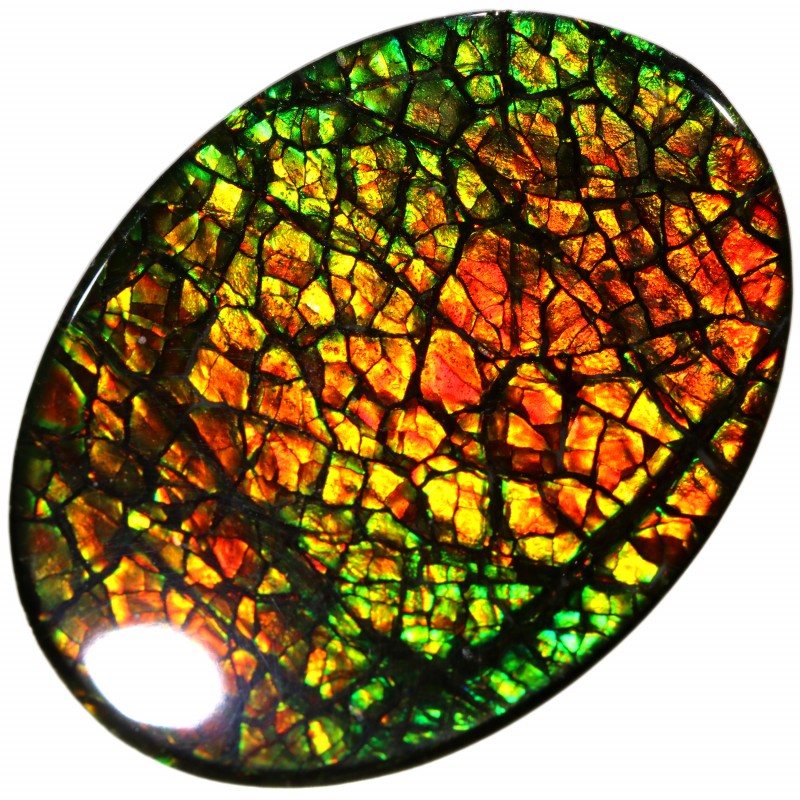 Image: fractured ammolite triplet
Image: fractured ammolite triplet
Find the rest of ammolite’s properties below:
Mineral family: None
Composition: Varies; Primarily calcium carbonate
Mohs hardness: 3.5-4.5
Color: Base is gray to brown; Iridescence can show every color
Crystal structure: Amorphous; Partly orthorhombic (aragonite)
Luster: Greasy to dull; Vitreous (glass-like) to resinous when polished
Transparency: Opaque
Refractive index: 1.52-1.68 (varies by composition)
Density: 2.60-2.85 (varies by composition)
Cleavage: None; Parting may be present
Fracture: Uneven to granular
Luminescence: Sometimes fluorescent in mustard yellow
Now, what about the spiritual ammolite stone meaning?

Ammolite Meaning & History
Knowing the difference between ammolite vs. ammonite, it’s probably obvious where the name “ammolite” came from. But where did ammonite’s name come from?
Remember that sun god Ammon? Ancient Roman naturalist Pliny named the fossil ammonia cornua, meaning “horns of Ammon,” after its shell.
Ammolite is perhaps most spiritually significant to Canada’s Blackfoot Nation tribes, who have used it for centuries. They call ammolite Iniskim, or “Buffalo Stone,” after a popular legend.
The legend starts during a tragic winter, as departed buffalo herds and frozen crops spelled starvation. One night, the Spirits sent a woman a dream with instructions to find a magic, colorful stone. After looking for days, she found ammolite in a cave.
The ammolite told her the steps for a ritual that would make the buffalo come back, so she completed the ritual. She returned to camp to see the buffalo herds had come back, and the threat of starvation was gone!
The Blackfoot people use Canadian ammolite as an amulet for luck while hunting buffalo and in ceremonial medicine bags for healing.

History
Ancient writings compared ammolite to a coiled snake, leading to the name “snakestone” and the practice of carving ammolite with snakeheads.
The first scientific description of Canadian ammolite came from D.B. Dowling in 1908. Still, it didn’t enter the gemstone sphere until 1962, when amateur gem cutters showed their ammolite creations at a small show in Alberta.
Calgary jewelry-store owners Marcel Charbonneau and Mike Berisoff coined the name “ammolite” in 1967 and made the first commercial ammolite jewelry. The World Jewellery Confederation granted it gemstone status, and commercial mining kicked off in 1981.
In 2004, Alberta named ammolite its official provincial gemstone. The city of Lethbridge followed suit in 2007.
Given its rich lore, what healing properties does ammolite have?

Canadian Ammolite Healing Properties
Gemstones’ colors and energies make them useful healing stones. Ammolite’s iridescence earned it the nickname “Seven Color Prosperity Stone” in Feng Shui, the ancient art of balancing energy flow.
Those who practice Feng Shui believe ammolite can purify the body and improve overall well-being. They tie ammolite crystal benefits to its colors (e.g., green for wealth and yellow for wisdom).
In more specific realms, what is ammolite used for?
Physical Healing
Canadian ammolite is said to purify and cleanse the body. Other purported benefits include preventing burnout and increasing strength.
Additionally, crystal healers use the ammolite gem to improve lung health, relieve childbirth pain, and help fight degenerative diseases.
Emotional Healing
Emotional ammolite stone benefits can include better concentration, emotional balance, and willpower. It’s said to help you feel comfortable being vulnerable.
Other emotional ammolite properties include improving relationship stability, settling depression, and soothing an anxious heart.
Chakra Healing
Chakra healing involves balancing your seven energy centers (chakras), each representing different symptoms. Ammolite is a chakra stone for your root chakra, the center of stability, trust, and connection.
When your root chakra is blocked, you may feel frustrated, scared, or paranoid. Open it with ammolite, and you can feel grounded, optimistic, and safe!

Ammolite Gemstone Properties
There isn’t an official grading system for Canadian ammolite, but the International Gem Society (IGS) has the best alternative.
The four IGS ammolite grades range from AA down to A- grades. Each grade has four categories of requirements the ammolite stone must meet: colors, iridescence, chromatic shift, and rotational range.
Here are each grade’s requirements:
AA Grade: 3 or more colors; Brilliant iridescence; Spectro-chromatic shift; 360° rotational range
A+ Grade: 1 or 2 colors; Bright iridescence; Dichromatic shift; 240° rotational range
A Grade: 1 color or pale colors; Inclusions affecting iridescence; Monochromatic shift; 180° rotational range
A- Grade: Dark or pale colors; Dark/dull iridescence; Little chromatic shift; 90° rotational range
If you’re confused, don’t worry. We’ll break down the categories below!
Color & Brilliance
The best ammolite has at least three colors from different color families. The main families are red (with orange and yellow), blue (with purple), and green. Higher concentrations of rare hues can also increase value.
What is the rarest color of ammolite? Purple is the rarest, meaning the more purple in an ammolite, the greater the value. Crimson and gold have similar effects.
Brilliance refers to the color’s saturation. More brilliant (saturated) colors mean higher prices. Ammolite with heavy inclusions is usually less brilliant.
Chromatic Shift
Chromatic shift is how many colors ammolite will appear and shift when viewed from different angles. The best type is a spectro-chromatic shift, where you can see every color on the spectrum as you turn the stone.
A dichromatic shift means the ammolite only shifts from one color to another, while a monochromatic shift shows colors in the same family. Little chromatic shift often means you’ll only see different shades of the same color.
Rotational Range
Rotational range is how far you can turn ammolite and still see brilliant colors.
The highest-value ammolite will show consistently vivid colors through a 360° rotation. In lower-quality specimens, you may see vivid color for 240° or even 90° before colors appear to darken. Inclusions can negatively affect rotational range.
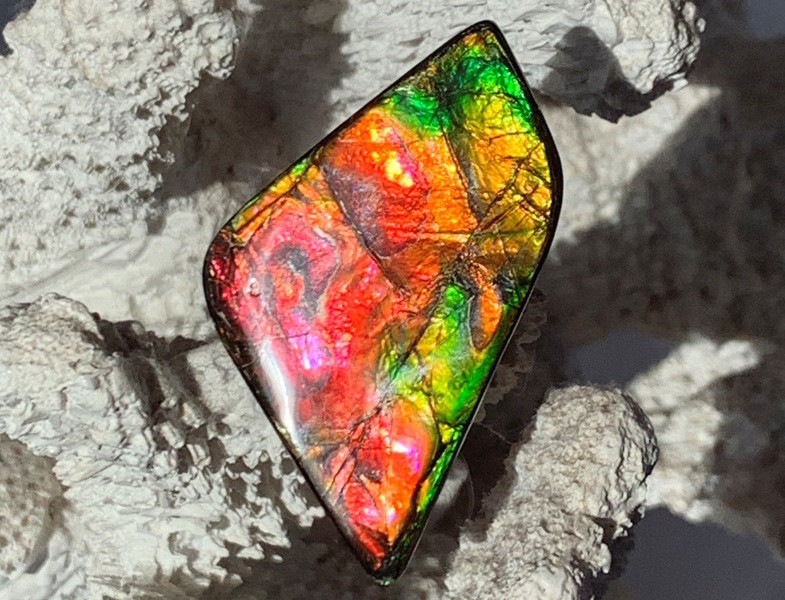
Cut
Most ammolite is cut as cabochons, often in freeform shapes. You won’t see many faceted ammolites, but you may see cabochons with faceted tops.
Ammolite is delicate, so most have a natural or synthetic backing, called a doublet. Doublets are where a jeweler glues a cabochon to a dark backing. “Naturals” are ammolite stones cut as freeform cabochons with a natural backing of shale or host rock (the rock ammolite formed around).
Synthetic backings are typically dark-colored glass or onyx. All backings, natural or synthetic, shouldn’t be thicker than 1.5mm.
Particularly fragile ammolite may become a triplet, similar to a doublet but with a domed, transparent top layer of glass or a synthetic gemstone.
Treatments
Treatments are often essential to making ammolite durable enough to wear. However, if an ammolite is thick enough to be used without a backing, which is rare, it will command higher prices.
Most ammolite treatments increase the stone’s durability, like epoxy impregnation to stabilize the material so it doesn’t flake during cutting. Doublets and triplets can be considered “treated” ammolite stones, and these also increase durability.
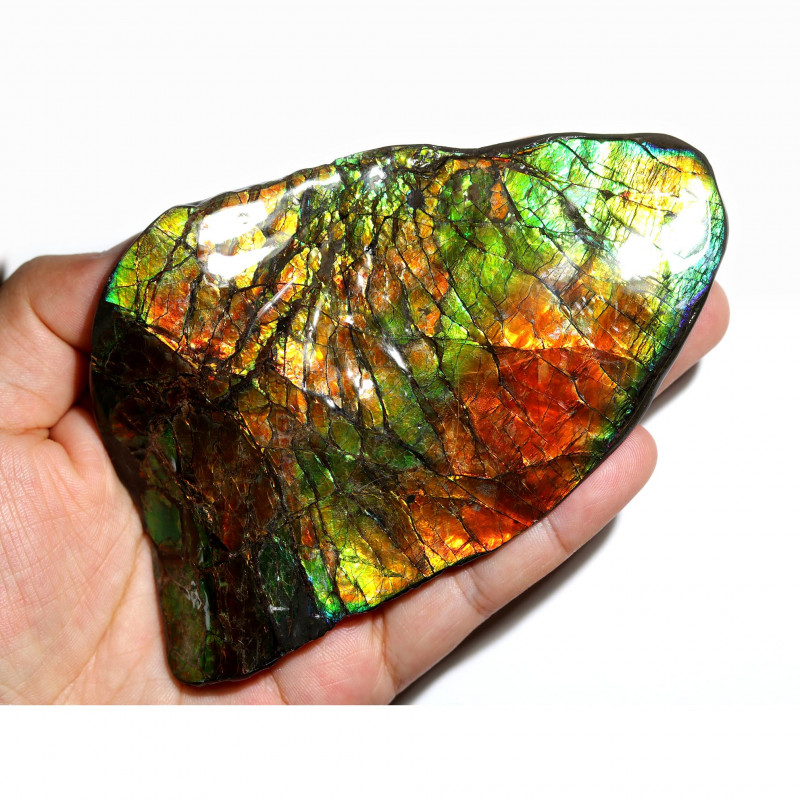
Canadian Ammolite Formation & Sources
Ammonites were squid-like mollusks with tentacles with jaws resembling beaks, and spiraled shells. They went extinct alongside dinosaurs when the Cretaceous Period ended, then accumulated on the ocean floor where sediment covered them.
As the Rocky Mountains grew, destructive volcanic activity left huge, poisonous layers of ash on the ocean floor. Seawater transformed the ash’s volcanic glass to clay minerals, trapping the ammonite fossils underneath.
Geological shifts brought the ocean floor to surface level in the Bearpaw Formation area, where gem-quality Canadian ammolite is found. Layers of ironstone concretions, iron pyrite, and high magnesium content protected the ammonites in this area from damage.
So, where is this Bearpaw Formation? Where can I find ammolite?
Mining Locations
The Bearpaw Formation stretches between the USA and Canada, going through Alberta, Saskatchewan, and Montana. The best ammolite comes from banks along the St. Mary River in southern Alberta.
Ammonite fossils are spread worldwide, but only specific geological conditions, limited to certain areas, make gem-quality ammolite.
You can also find ammolites in England and Madagascar, but those are more fragile, with duller iridescence and coloring.
So, is ammolite a valuable gemstone? Absolutely! Its rarity, history, and exclusivity make it a precious commodity.
Then what is the value of ammolite?
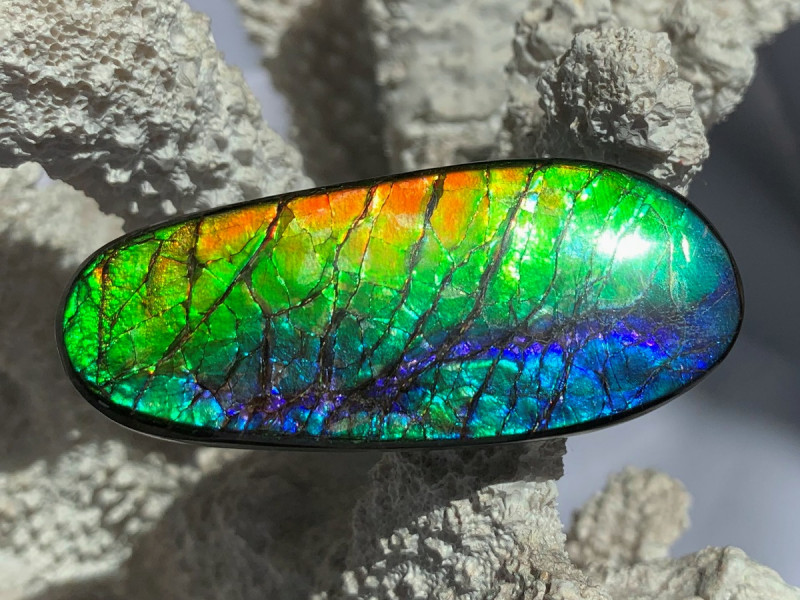
Ammolite Gemstone Price & Value
Many factors affect ammolite’s price, but the overall ammolite price per carat range is $5-$60 per carat. The ranges below are based on wholesale prices.
Ammolite cabochons with multiple colors and bright iridescence range from $5-$40 per carat. Those with fewer or common colors like red are usually $2-$12 per carat.
The ammolite price for doublets ranges from $2-$10 per carat for lower-quality and $5-$30 per carat for higher-quality. However, an ammolite pendant with a doublet can be $50 to $500, depending on the metals used and craftsmanship required.
Rough ammolite specimens are most affordable at $0.05-$5 per carat.
Does ammolite increase in value? It probably will! How much Canadian ammolite remains in Alberta is unclear, but scientists estimate there’s only enough for 6-8 more years of mining.

Canadian Ammolite Care and Maintenance
Given ammolite’s low ranking on the Mohs mineral hardness scale and high price, you’ll want to know how to care for your gemstone.
Some ammolite stone jewelry is more vulnerable to breakage. An ammolite ring, for instance, is more vulnerable to hits than a pendant or brooch. If you opt for a ring, make sure to get a triplet with a protective setting.
Safely clean Canadian ammolite by gently wiping it with a damp, microfiber cloth, or use lukewarm, soapy water and a toothbrush.
Avoid extreme heat, hairsprays, perfumes, and acids to prevent diminishing ammolite’s color or damaging the stone.

Aim High With Ammolite!
This vibrant gemstone combines fascinating history, legends, and colors to create an unparalleled jewel. Ammolite goes through prolonged, intense pressure to get its gorgeous colors, reminding us that staying resilient through the most challenging struggles is what brings out your best self.
With supply dwindling and prices set to increase, there’s no better time to get a beautiful Canadian ammolite of your own.
Search the Gemstone Encyclopedia
Related Auctions
Related Articles
Originally the Birthstones or gemstones were associated with a zodiac sign or the month of a individuals birth. Find out what your stone is and view the stones we have for sale
8th Feb 2021
There are dozens of quartz and chalcedony gems with various colors and patterns. Learn all about quartz properties and every type of quartz, from amethyst and agate to plasma and phantom quartz!
15th Oct 2020
Hackmanite is a pink to violet sodalite gem known for its unique color-change and luminescence. Learn why hackmanite is special, from its rare qualities to the types of hackmanite jewelry available.
28th Mar 2018
Latest Articles
Shortite is a rare mineral and rarer gemstone, usually found as colorless or yellow wedge-shaped crystals. Learn the value, history, and properties of shortite in this guide!
9th Dec 2024
Senarmontite is an uncommon antimony mineral mostly used industrially but occasionally collected as rare gems or pearly crystals. Find out all of the traits, uses, prices, and history of senarmontite.
27th Nov 2024
Tantalite is a group of red, brown, or black minerals containing the rare and valuable element tantalum. Discover the uses, history, prices, and properties of tantalite gemstones in this guide!
11th Nov 2024
Article Categories
How To's is where you will find helpful articles from gem Rock Auctions on how to cut gemstones, select gemstones and buy gemstones.
9 Articles





